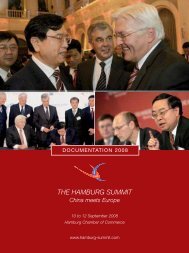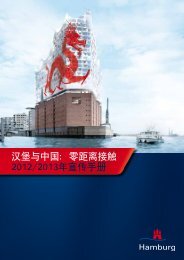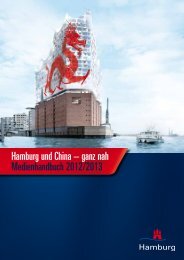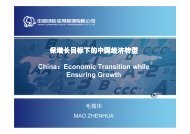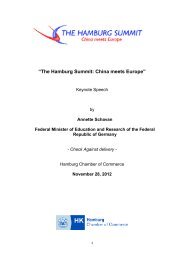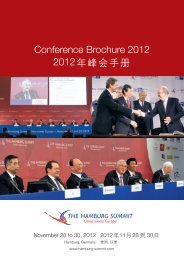Documentation Brochure - Hamburg Summit
Documentation Brochure - Hamburg Summit
Documentation Brochure - Hamburg Summit
- No tags were found...
Create successful ePaper yourself
Turn your PDF publications into a flip-book with our unique Google optimized e-Paper software.
China’s Environmental Situation<br />
Meinhard von Gerkan, Klaus Töpfer, Alfred Th. Ritter and Soledad Blanco (f. l. t. r.) discussed the various environmental challanges China faces<br />
The Rhine,” joked Klaus Töpfer, referring<br />
to the swim he took in the river<br />
as Germany’s federal environment<br />
minister in May 1988, “was not dirty<br />
only after I had bathed in it." All rivers<br />
had been so polluted back then that<br />
there was an urgent need for action.<br />
Töpfer, director of the United Nations<br />
Environment Programme (UNEP) until<br />
March 2006, thereby made the point in<br />
his keynote address to the <strong>Hamburg</strong><br />
<strong>Summit</strong> that environmental issues are<br />
by no means shelved only in developing<br />
countries. “Yet environmental protection<br />
is an economic necessity,” he said.<br />
Looking at China, Töpfer who advises<br />
the Chinese government on environmental<br />
issues, said, “financial and<br />
human capital are available in sufficient<br />
quantity. If the country is to maintain<br />
its growth momentum it must reinvest in<br />
its natural capital.” That was where the<br />
crucial bottleneck was to be found.<br />
Twenty of the world’s 30 cities with<br />
the highest levels of atmospheric pollution<br />
were in China. That was why it was<br />
important for the government to invest<br />
in environmental technology. Töpfer<br />
specifically advocated developing<br />
renewable energy resources and<br />
decentralising power production. “The<br />
Chinese leaders know that efficiency in<br />
the use of resources must improve.”<br />
The panel agreed that the Chinese<br />
government today is more keenly aware<br />
of ecological considerations. German<br />
chocolate manufacturer Alfred Th.<br />
Ritter, recipient of the China-Europe<br />
Sustainability Award of the <strong>Hamburg</strong><br />
<strong>Summit</strong> 2006, even said that the two<br />
best solar systems for the production of<br />
regenerative energy were in China. He<br />
now has solar collectors made in China.<br />
“With them we have reduced by a third<br />
the energy costs of our production in<br />
Germany,” he said.<br />
Chinese entrepreneur Zhang Yue, recipient<br />
of the China-Europe Sustainability<br />
Award of the <strong>Hamburg</strong> <strong>Summit</strong><br />
2004, said that his country had undertaken<br />
an U-turn in environmental policy.<br />
What had been done in the past six<br />
months was comparable to a revolution.<br />
“The ecological problem will be solved”,<br />
he ascertained. Zhang’s company Broad<br />
Air Conditioning manufactures ecofriendly<br />
air conditioning systems that in<br />
some cases are powerful enough to<br />
supply entire airports. A more critical<br />
note was added by <strong>Hamburg</strong> based<br />
architect Meinhard von Gerkan, whose<br />
office in China designs cities and has<br />
built, amongst others, the trade fairs and<br />
congress centres in Nanjing and<br />
Shenzhen. There was no logical and<br />
ecological urban planning in China at all,<br />
he said. Cities grew uncontrolled. “The<br />
distance between Shanghai and Nanjing<br />
is 200 kilometres, but you cannot say<br />
where one city ends and the other begins,”<br />
von Gerkan said. In addition, enormous<br />
amounts of heating energy were<br />
wasted in housing. Soledad Blanco of the<br />
EU Commission’s environmental affairs<br />
department also felt that China had major<br />
environmental policy deficits. At the<br />
regional level there were no minister to<br />
implement the government’s environmental<br />
programmes. Yet there was so<br />
much to be done. No country in the<br />
world used as much coal as China. “Every<br />
14 days a new 1,000-megawatt coalfired<br />
power station is built,” Ms Blanco<br />
said. China was also responsible for 40 %<br />
of the world’s carbon dioxide emissions.<br />
“The consequences for global warming<br />
are immense,” she said.



